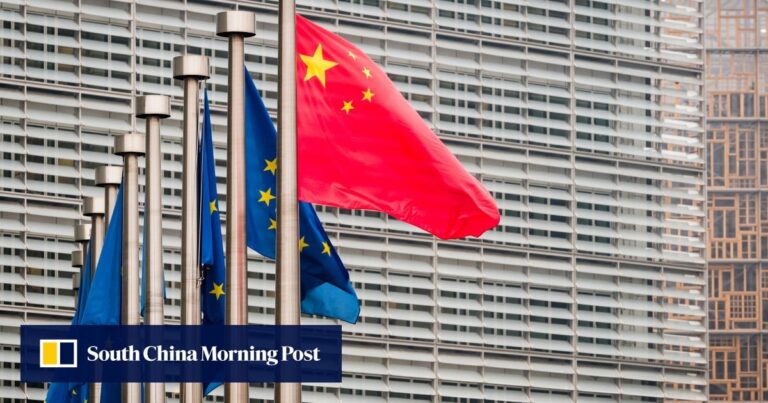“The EU has agreed to a 37.6% tariff cut on electric vehicles (BEVs) made in China, which will be revised to 37.6% on Friday and will remain in place for up to four months. The ministry also denied comments made by EU Ambassador Jorge Toledo that China had only recently responded to the EU over the tariffs.
The Commerce Department said EU practices covered by the China investigation included EU investigations into Chinese-made locomotives, solar panels, wind power products and security inspection equipment.
Such investigations “are typically the start of trade retaliation,” said Gary Ng, senior economist at Natixis Corporate and Investment Bank.
“This is not the first time China has used this policy tool and further tariffs on certain European products are possible,” he explained. “Nevertheless, given the politically polarized situation, EU-China relations are probably at an impasse and are unlikely to deteriorate significantly further.”
Protectionist trade measures do not help develop global green industries
EU competition spokesman Lee Zuber said the Commission was still studying the details of the China investigation but added that it was “using all tools at its disposal, including foreign subsidy restrictions.”
“Within the EU, we have an elaborate system of state aid management in place, which is a key pillar in ensuring fair competition and a level playing field between companies within the EU and among member states,” she told the Post.
“All companies, regardless of their location or nationality, are subject to the rules set out in the Foreign Subsidies Regulation. This also applies to state aid and antitrust applications,” Zuber added.
Ambassador Toledo said on Sunday that China only recently responded to the EU on the tariffs, despite the EU having offered talks to the Chinese government for several months.
China’s Foreign Ministry later said the ambassador’s remarks were “grossly inconsistent with the facts” and noted that China had been in consultation with the EU since the investigation began last year, pointing to seven ex parte communications sent to the EU between October and June.
“Protectionary trade measures are not conducive to the development of global green industries or cooperation in the auto sector,” a ministry spokesman said, adding that China would take all necessary measures to safeguard its rights and interests in the face of abusive rules.
However, some analysts have noted that China’s investigation into EU trade barriers does not necessarily reflect an “escalation” in trade tensions between the trading partners, but could rather be a gesture following recent negotiations.
“[This is] “This is a normal move in trade negotiations and is likely a response from Beijing after recent talks with the EU over tariffs on electric vehicles,” said Ding Shuang, chief economist for Greater China at Standard Chartered Bank.
“The negotiations need to ensure fairness for both sides, including not only the EU’s investigation into China but also China’s further investigation into the EU’s investigation,” Ding said. “Whether trade friction between the two countries will escalate depends on whether they can find common ground after the negotiations.”
Wednesday’s move comes after the Chinese Chamber of Commerce filed complaints since late last year against EU practices under the guise of anti-subsidy.
“The investigation will continue until January and could be extended, so it’s still not clear what the outcome will be,” said Dong Jinyue, chief economist at BBVA Research. “But historically there are two possible outcomes: one is that they take retaliatory action against the EU, and the other is that they resolve the issue politically or go back to the negotiating table.”
The EU’s provisional countervailing duties on Chinese EV makers came into effect on Friday, but the issue is still being negotiated with China, with a final ruling expected within four months.
Mei Yuan, an assistant professor of economics at Singapore Management University, said the EU’s investigation was in line with the World Trade Organisation’s countervailing duties rules.
“We don’t know whether the EU was stricter or more discriminatory towards Chinese companies in the actual process. [Mofcom] The situation needs to be investigated,” he noted.
Cha Daozhong, a professor at Peking University’s School of International Studies, said “China is at a disadvantage” in the tit-for-tat battle with the EU over countervailing duties and that the chances of the EU “giving in” were “almost zero”.
“The EU can hope to encourage increased Chinese EV investment in member states,” he added, but said China “does not necessarily have the option” to match the EU in tariff levels on the products under investigation “to avoid an unfavourable increase in sales prices”.

